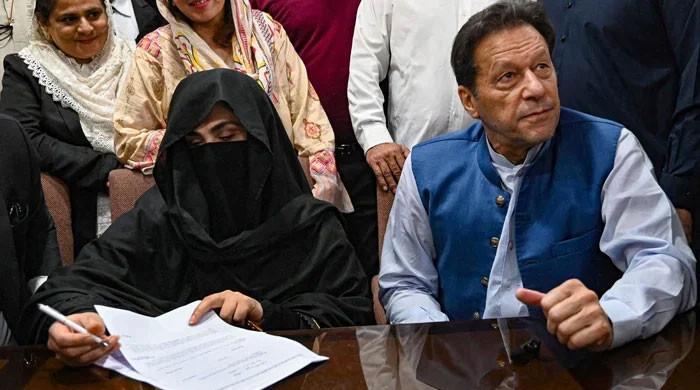The accountability court has also disqualified the PTI founder Imran Khan for 10 years
The legal woes of Pakistan Tehreek-e-Insaf (PTI) founder Imran Khan continue to multiply as an accountability court on Wednesday sentenced the former prime minister and his spouse Bushra Bibi to 14 years in prison with rigorous punishment in the Toshakhana reference.
Accountability court’s Judge Muhammad Bashir announced the verdict, also disqualifying the former prime minister for 10 years while handing over a fine of Rs1.57 billion — 787 million each — to the couple.
During the previous hearing, which was also held at Adiala jail, the court recorded Bushra Bibi’s statement under Section 342.
Khan told the court that his wife had nothing to do with the case and was being humiliated by being forcibly dragged into it.
At the outset of the hearing today, Judge Bashir asked Khan if he recorded his statement. To this, the former premier said that he would submit his statement once his lawyers came.
“I have been deceived as I was only called to mark my attendance for the hearing,” said the PTI founder.
The court then took Bushra Bibi into custody from Adiala jail.
IHC declares jail trial notification valid
On the other hand, the Islamabad High Court (IHC) termed the notification of Khan’s jail trial in Toshakhana and the £190 million settlement cases as valid.
The court also dismissed the PTI founder’s petitions against the jail trial in the cases filed by the National Accountability Bureau (NAB).
Apparently, the jail trial was in view of the threats to the life of the petitioner, adding that it was not “malice”.
IHC Chief Justice Aamer Farooq and Justice Tariq Jahangiri issued a detailed verdict while also rejecting the petitioner’s objection over the appointment of the accountability judge.
The IHC, in its judgment, said that the executive is responsible for determining the location of the sessions court. However, in the absence of an executive order, the relevant court can issue an order to conduct the hearing somewhere else.
“However, the court is bound to conduct the hearing in the given location in the presence of the executive order,” the judgment added.
The IHC said that there was an appeal filed in the cipher case before a two-member bench, adding that there is no law concerning the location of the hearing under the Official Secrets Act.
“Section 352 of the Criminal Code is applied in the Official Secrets Act case in the absence of a clear law,” said the court. It added that the high court rules and Section 352 will be applied when the sessions court passes an order concerning the location.
The court said that the objection over the notification of jail hearing being issued before the reference was correct.
“The NAB prosecutor had said that at the time of the notification, the proceedings of bail and remand were underway,” the IHC said, adding that the proceedings cannot be declared null and void on the basis of an executive or trial court order.
Toshakhana case
The Toshakhana has been under a microscope ever since the emergence of the allegations that Khan purchased the gifts he received as prime minister at throwaway rates and sold them off in the open market for staggering profits.
The 70-year-old cricketer-turned-politician was accused of misusing his 2018 to 2022 premiership to buy and sell gifts in state possession that were received during visits abroad and worth more than Rs140 million ($635,000).
The gifts included watches given by a royal family, according to government officials, who have alleged previously that Khan’s aides sold them in Dubai.
Moreover, seven wristwatches, six made by watchmaker Rolex, and the most expensive a “Master Graff limited edition” valued at 85 million Pakistani rupees ($385,000), were also among the gifts.
A reference was forwarded by National Assembly Speaker Raja Pervez Ashraf to the Election Commission asking it to probe the matter.
In October 2022, the electoral body declared the former premier guilty of corrupt practices and filed a complaint in an Islamabad court.
A timeline of the case
On October 21, 2022, the ECP maintained that the former prime minister made “false statements and incorrect declarations” about the gifts and disqualified him under Article 63(1)(p) of the Constitution.
Subsequently, the election watchdog moved a sessions court in the federal capital, seeking criminal proceedings against the PTI chief for allegedly misleading the ECP regarding gifts received from foreign dignitaries while he was in office.
The trial court indicted the PTI chairman on May 10 and rejected his petition to declare the case inadmissible.
On July 4, the IHC overturned the trial court’s ruling and directed it to rehear the petitioner and decide the matter within seven days.
On July 8, ADSJ Dilawar declared the Toshakhana case against Khan as maintainable, which was again challenged in the IHC.
During the trial proceedings, Khan’s lawyers also accused the presiding judge of bias on the basis of his Facebook posts and sought the transfer of the case.
On August 2, the trial court rejected the list of witnesses presented by the PTI chairman, stating that he failed to prove their “relevance” in the criminal proceedings against him. It was also challenged in the high court.
However, the PTI chairman again moved the high court seeking a stay and transfer of the case to another court.
On August 4, IHC Chief Farooq referred the matter back to the trial court with a direction to re-examine the jurisdiction and any procedure lapse in the filing of the complaint by the Election Commission.
On August 5, the trial court found the former prime minister guilty of misdeclaration of state gifts.
Today, the IHC announced the short verdict that it reserved a day earlier wherein it directed the authorities to release the PTI chief on bail.
According to sources, the PTI chief has been directed to submit a surety bond of Rs100,000 against the bail.

